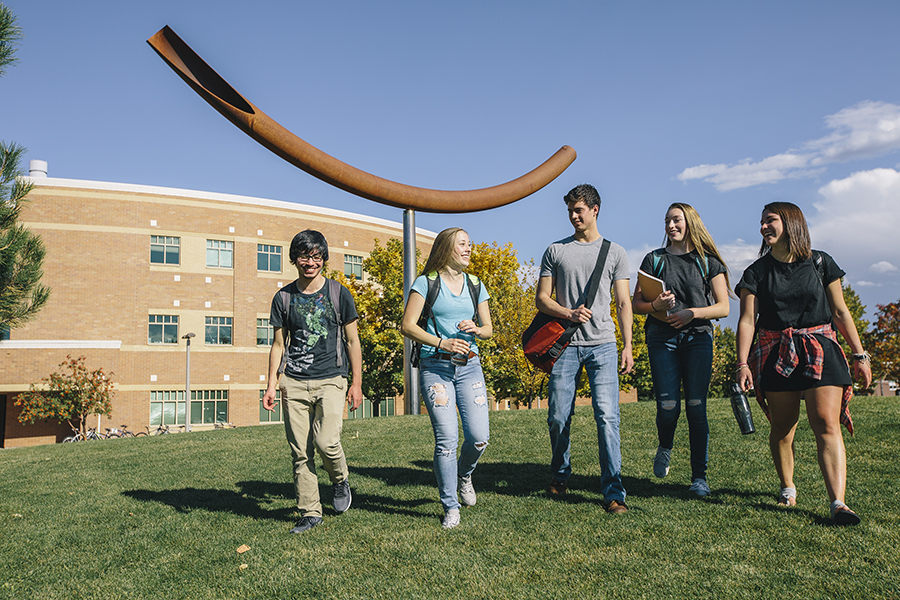The Journal of Education and Work recently published an article exploring how exposure to creative coursework, as well as confidence in creative thinking, were able to predict students plans for self-employment and starting a business. Authored by NSSE research scientist Angie Miller and Mondragon University postdoctoral researcher Paula Alvarez Huerta, this paper used data from the Senior Transitions NSSE Topical Module.
Entrepreneurship has great potential to solve unmet societal challenges (Bazan et al., 2020), and therefore it is increasingly vital to better understand the precursors and influences of entrepreneurial careers (Newman et al., 2019). Much of the research on entrepreneurship training within higher education focuses on specific fields, such as business, although there has been a push from some to integrate entrepreneurship into the wider curriculum (Roberts, 20212). Creativity has also been noted as an essential outcome of higher education (Hernández-Torrano & Ibrayeva, 2020), and there is growing theoretical and empirical work asserting the importance of creativity in developing entrepreneurial careers (Smith et al., 2016). Given the previous research, this study addressed whether exposure to creative coursework, along with confidence in creative thinking, could predict entrepreneurial intentions among university students, even after controlling for other student identities, experiences, and institutional characteristics.
The data used in this study were from the 2017 and 2018 NSSE administrations. Responses were available from over 64,000 seniors attending 274 baccalaureate-granting institutions, who mirrored the overall NSSE sample in terms of demographic characteristics. In the Senior Transitions module, a set of items asks seniors:
To what extent has your coursework in your major(s) emphasized the following?
1) Generating new ideas or brainstorming,
2) Taking risks in your coursework without fear of penalty,
3) Evaluating multiple approaches to a problem, and
4) Inventing new methods to arrive at unconventional solutions.
These items comprise the measure of creative coursework exposure used for this study (validated in previous NSSE research). The module also asks “How much confidence do you have in your ability to complete tasks requiring the following skills and abilities?” with “Creative thinking and problem solving” as one of the items in a list of ten. This item was used as a proxy for creative efficacy.
Binary logistic regression models (controlling for other student- and institution-level variables) showed that that greater exposure to creative coursework, as well as confidence in creative thinking, have a significant, positive effect on plans for self-employment and starting a business. In fact, even though many other predictor variables were also significant, creative confidence was the strongest predictor for both types of unconventional career plans, with odds ratios of 1.256 for self-employment and 1.265 for starting a business). Creative coursework was also a significant predictor, although relatively smaller on magnitude. Additionally, there were several other significant predictors on the models, most notably major field. For instance, business and communication majors were much more likely than other fields to plan for unconventional careers. Interestingly, arts & humanities majors are more likely to plan for self-employment, but not starting a business.
These results highlight the relevance of promoting creative thinking among university students and support the inclusion of creative self-confidence in future studies of entrepreneurial intentions. Other implications point to the need to design specific initiatives to promote creative thinking, and increase creative confidence, for university students across various subgroups and major fields. There may also be a need for differentiated career advising strategies to address entrepreneurial intentions. As shifts in the labor market are expected to influence nearly all sectors (OECD, 2019), such strategies should focus on preparing students for success along non-traditional career paths across all major fields.
Does your institution have data from the Seniors Transitions Topical Module? Are you interested in using the creative coursework scale to dive deeper into your own seniors’ responses? If so, please contact anglmill@iu.edu for a copy of the scale creation syntax!
Full article:
Miller, A. L., & Alvarez Huerta, P. (2022). Connecting creativity, confidence, and unconventional career plans. Journal of Education and Work, 35(6-7), 766-781. https://doi.org/10.1080/13639080.2022.2128185


